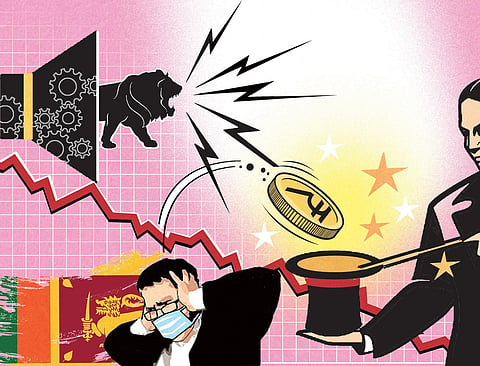

The tumultuous events in neighbouring Sri Lanka have drawn the attention of onlookers and analysts, compelling all to ask what lessons they hold for the rest of the world?
Some things are obvious. The ‘landslide’ electoral victory registered a couple of years ago could not help the Rajapaksas remain in office. The groundswell of public protests and anger paralysed the government, and ultimately forced ‘Gota to go home'. The writing on the wall seems to be clear that the popular mandate received isn’t forever. Elected leaders, however charismatic, can’t take support for granted. Performance matters more than populist slogans or grandiose visions of the future.
For some time, the leaders can escape the wrath of the people by raising the bogey of threats to the nation’s integrity and security, searching for the enemy within—a linguistic, ethnic or religious minority—whipping up chauvinism, pointing out international conspiracies, but in the end, it all boils down to the management of the economy and the government ensuring social justice. Authoritarian rulers—corrupt dynasts benefiting their cronies—lose their sheen very fast. What allowed the Rajapaksas a long respite was that Sri Lankans were led to believe that it was they who had defeated the dreaded LTTE, which had embroiled the country in a three-decade-long civil war.
Securitisation of politics under the Rajapaksa family had led to the erosion of democratic institutions, suppression of human rights, and freedom of expression. People in Sri Lanka had returned the Rajapaksas to power with the hope that now the reconciliation and healing would begin. Unfortunately, the outbreak of Covid and the terrorist attack targeting a Church gave them an excuse to continue on the old path that could only lead to the precipice.
Living extravagantly on borrowed money and pledging the country’s land and ports to lenders like China may have made a good life possible for the microscopic elite, but it pauperised the common people and made existence miserable. It is when all hope is extinguished and there is nothing to lose that the masses rise and revolt, driving selfish and arrogant rulers from their palaces.
Some scholars have opined that rejoicing at the deliverance may be hasty. The tidal surge of people’s power in Sri Lanka may ebb like the Arab Spring ushering in a long winter of discontent. Gota Rajapaksa and Ranil Wickramasinghe didn’t resign as promised but acted in a manner deliberately creating a crisis and power vacuum. Those ousted may yet try to bounce back to power or rule through proxies. They are, however, hardly likely to succeed as the country they have bankrupted is precariously poised at the edge of an abyss.
We would be naive to remain complacent about our own future. The Indian economy, despite the repeated reassuring noises made by the government, is certainly not in the pink of health. The rupee is falling steadily against the dollar and this certainly does not cause a celebration. Theoretically, this might make Indian export cheaper, but before the country takes advantage of this, it has to produce or manufacture items for exports that meet international quality standards and are competitive. The interruptions in the supply chain during the pandemic have exposed the hollowness of our claims of self-sufficiency (atmanirbharta) or even more boastful claims regarding ‘Make in India’ for ourselves and the world. The Gir lion looks attractive with gears and wheels adorning its body, but it is yet to roar.
India’s dependence on intermediaries from China and countries in Europe continues to be high. The foreign exchange reserves are registering a decline at an alarming rate. With the Federal Reserve in the US increasing rates, the foreign money invested in India is also following the route to a destination where better returns are assured.
Other countries in South Asia are no strangers to such constitutional crises and the decline of constitutional morality, convention and practices. Pakistan and Nepal both are facing a similar crunch and more than once the assault on institutions and the dilution of constitutional provisions to suit the vision of
a strong leader enjoying a brute majority. In short, a landslide victory and a charismatic leader do not necessarily ensure either democracy or security and prosperity of any country. Democracy, in any case, is more than a numbers game.
India can’t consider that it is immune to ‘extreme weather events in the economic environment like the ones that have played havoc in Sri Lanka. The Reserve Bank of India has recently cautioned us that many of the states in the Indian Union are under a debt burden and need to take stern fiscal measures to avoid a spiralling crisis. Unfortunately, partisan politics and electoral compulsions make it impossible to deal with the challenge rationally.
It is no consolation for the suffering Indians to be told that what they are experiencing is a global phenomenon and there is little our government can do about it. It doesn’t have a magic wand to pull any proverbial rabbits out of the hat.
Pushpesh Pant
pushpeshpant@gmail.com
Former professor, Jawaharlal Nehru University